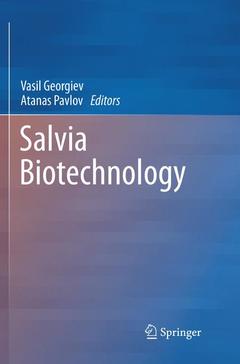Salvia Biotechnology, Softcover reprint of the original 1st ed. 2017
Coordonnateurs : Georgiev Vasil, Pavlov Atanas

The genus Salvia represents nearly 1,000 species that are widely distributed around the world. It is the largest in the Lamiaceae family. Traditionally, infusions of Salvia species have been widely used to treat oral inflammation, throat and headaches, and digestive disturbances in various folklore- and ethno-medicine practices worldwide. The antispasmodic, antiseptic and hypoglycemic effects of their extracts have been recognized by the ancient healers a long time ago before the development of modern medicine. With the advances in phytochemistry and pharmacology, terpenes, polyphenols and volatile compounds have been recognized as the source of bioactivity in Salvia extracts. Nowadays, because of their valuable pharmaceutical and nutraceutical properties, many Salvia species have been widely used as ingredients in food, pharmacy and cosmetic industries. The economic importance of Salvia plants continues to increase, following closely the growing interest to the concept for modern healthy lifestyle, based on prevention by consuming quality foods and nutraceutical supplements of natural origin.
However, the growing demand has led to overexploitation of natural habitats and in the last few years many wild growing Salvia species have shrunk or fallen under threat. Obviously, to deal with that problem and to prevent ecological crisis, there is an urgent need for alternative, renewable sources of Salvia biomass. Plant biotechnology can provide a wide range of tools for development of economically feasible continuous production of standardized valuable phytochemicals. Plant in vitro culture technology is a powerful method for continuous production of plant secondary metabolites under controlled conditions, recently adapted to various Salvia species. Salvia in vitro systems are harmless to natural plant populations and can be grown independently of environmental factors, geographical latitude, climatic change, and seasonal variations. Several bioactive metabolites from rare and endangered Salvia plants can be produced by employing different plant in vitro systems. However, the researches on development of large scale biotechnology, based on Salvia in vitro systems, are still in early stages and many points still have to be addressed before the commercialization to take place.
In this book we intend to summarize the recent achievements in research with Salvia in vitro systems as biological matrixes for the production of pharmaceutically important secondary metabolites. Further we invited leading experts to present their recent studies on phytochemistry, ethnobotanical and ethnophamacological aspects of genus Salvia. Safety and legal issues related to implementation of Salvia plants and in vitro cultures extracts in foods, cosmetics and pharmaceutical products will be discussed as well.
Dr. Vasil Georgiev obtained his PhD at The Stephan Angeloff Institute of Microbiology – Bulgarian Academy of Sciences in 2009. He is an expert on bioprocess engineering and secondary metabolites production by plant cells, tissue and organ cultures, functional genomics, metabolite profiling, development and improvement of plant in vitro production platforms. In 2011 he was awarded by the Bulgarian Academy of Sciences with the “Prof. Marin Drinov” prize for the outstanding research in biological sciences. Dr. Georgiev did postdoctoral research at Florida A&M University, USA (2012-2016). Since 2016, he is Associate Professor in the Laboratory of Applied Biotechnology at The Stephan Angeloff Institute of Microbiology – BAS and also joined the Department of Organic Chemistry at the University of Food Technologies, Plovdiv, Bulgaria
Prof. Atanas Pavlov completed his PhD in biotechnology at the Stephan Angeloff Institute of Microbiology, Bulgarian Academy ofSciences in 1998. From 2003 to 2005, he did postdoctoral research at the Institute of Food Technologies and Bioprocess Engineering, University of Technologies, Dresden, Germany. In 2005, he joined The Stephan Angeloff Institute of Microbiology, Bulgarian Academy of Sciences as an Associate Professor. In 2009, he received his habilitation (DSci) and is since 2010 a Professor at the Laboratory of Applied Biotechnology. Since 2011 he also holds a second Professor position at the University of Food Technologies on Plovdiv, Bulgaria. His research is mainly focused on the production of specific bioactive metabolites by plant cell, tissue and organ cultures.
Date de parution : 12-2018
Ouvrage de 427 p.
15.5x23.5 cm
Date de parution : 04-2018
Ouvrage de 427 p.
15.5x23.5 cm
Disponible chez l'éditeur (délai d'approvisionnement : 15 jours).
Prix indicatif 105,49 €
Ajouter au panier


